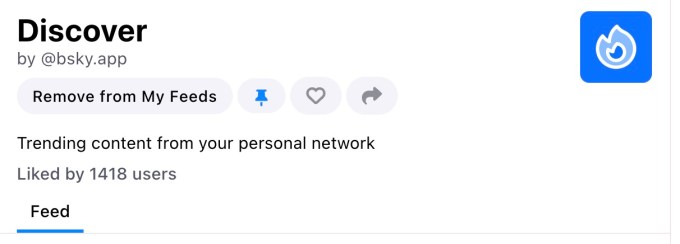Bluesky, one of the many would-be Twitter replacements now on the market, is making a notable change to how users discover new content on its network. Previously, the Bluesky app would feature popular posts in a feed it called the “What’s Hot” feed — something that its users aspired to find a place on, as it would bring their content more attention and potentially gain them more followers. Now, that feed is being replaced with an algorithmic and personalized “Discover” feed that features more than just trending content.
Explains the company, the initial version of the new “Discover” feed will mix trending content with posts from accounts you follow and posts from accounts “near your social graph.”

This type of recommendation system isn’t novel. In fact, it’s similar to algorithmic feeds used by other social networks, including Twitter’s (now X) For You timeline, TikTok’s For You page, Instagram Explore’s page or Facebook’s revamped News Feed. The idea is that the combination of posts focused on your interests and those from your broader social graph will create a uniquely engaging feed for each individual user.
Bluesky isn’t the first Twitter rival to turn to personalization, either.
Only yesterday, in fact, the Mastodon app Mammoth proposed its own personalized For You feed to make its app feel more familiar to those fleeing Twitter to other microblogging social networks, like the open source Mastodon. And of course, Meta’s entry into the Twitter clone space, Threads, also began with an algorithmic feed before more recently adding the in-demand reverse chronological timeline.
The reason for turning to this type of feed is simple: it’s more engaging, research shows. In a study published this week with Meta’s cooperation, researchers found that users who were only given a reverse chronological feed would spend “dramatically less time on Facebook and Instagram.” Algorithmic feeds simply outperform when it comes to time spent and engagement, which is why they’re broadly adopted across today’s social platforms as the default — despite demands from users for a more basic “Following” feed.
However, the difference with Bluesky’s implementation is that it doesn’t force its algorithmic feed on its users. It’s simply an option users can employ if they choose.
“What’s new is our focus on algorithmic choice — letting you unpin feeds you don’t like, and discover and install new feeds that better suit your interests,” a Bluesky blog post explains. “If you don’t like our new Discover feed, you can simply remove it and replace it with any other custom feed.”
Bluesky first rolled out custom feeds in May, allowing users to subscribe to feeds with different algorithms or themes. To the end user, the feeds work a lot like Twitter Lists as they can be pinned to a “My Feeds” menu in the app’s sidebar for easy access. Among the feeds available at launch from Bluesky were its “What’s Hot” feed featuring trending content and the “What’s Hot Classic” feed where any post that featured 12 likes was featured — a feed that really only made sense when the network was small.
Since then, users have built many other custom feeds, like those focused on types of content — like science, dog pics, gardening, art and more — or those that help you to view your social graph in a different way — like a mutuals feed, a feed of only photos posted by people you follow, or a feed that’s customized based on your likes, for instance.
Despite Bluesky’s innovation in terms of algorithmic choice and its underlying decentralized networking protocol, there are concerns about the future of this particular Twitter clone. The company has repeatedly faced criticism over its mishandling of moderation challenges, most recently having allowed usernames with racial slurs to slip through.
It’s also still operating in an invite-only mode, despite now facing a more serious threat than Twitter itself, given Meta’s entry into the market where its Threads app hit 100 million users faster than any other app to date. Bluesky, meanwhile, hit its first million installs this month, but only counts some 400,000+ users as it remains closed to the public. At this point, the company may be squandering a time-sensitive opportunity to entice the limited audience of those leaving Twitter to try its app instead. The negative headlines about its lacking Trust & Safety capabilities aren’t helping its reputation, either.
In other words, Bluesky may build a clever system featuring custom feeds and algorithmic choice, but its impact may be limited if the app remains closed, its network unwelcoming to marginalized users and its competition so robust that users establish themselves elsewhere.































Comment